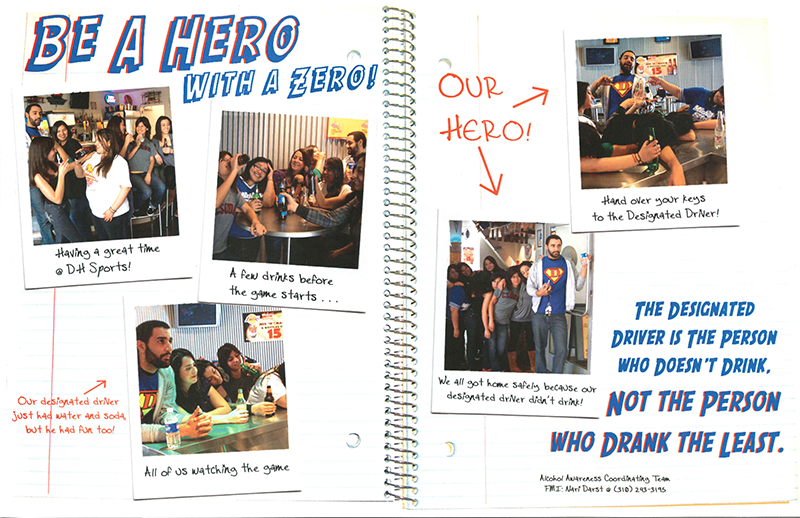Alcohol Awareness
Latest News
- Read CSUDH's Statement on Drug-Free Schools and Communities.
While we are required to inform students of the alcohol policies for the campus, we also think everyone should read this important statement. - Read CSUDH's Policy on the Possession and Consumption of Alcohol.
- Read CSUDH's Alcohol and Substance Abuse Policy.
Campus Resources
- Student Health and Psychological Services
SHC Building
Phone: (310) 243-3629 - Career Center
University Library, 3rd Floor
Phone: (310) 243-3625 - University Police
Welch Hall, B-100
Emergency: 911
Non-Emergency: (310) 243-3639
Online Resources
- Virtual Bar - This interactive program educates the user about how alcohol consumption affects an individual's blood alcohol concentration (BAC) level. The program allows users to project their BAC level based on gender, weight, the type and number of drinks consumed, and time elapsed at the "Virtual Bar."
- Center for Disease Control Alcohol Resources
- National Institute on Alcohol Abuse and Alcoholism
Off-Campus Resources
- National Council on Alcoholism and Drug Dependence South Bay
Phone: (310) 328-1460 - AA South Bay Central Office
Phone: (310) 618-1180
 Alcohol Awareness Coordinating Team (AACT)
Alcohol Awareness Coordinating Team (AACT)
In 2001, the California State University system instituted an alcohol policy which required each campus to develop an on-going alcohol awareness campaign. The Alcohol Awareness Coordinating Team (AACT) was established as a part of the CSU Alcohol Usage Policy. The committee is made up of a cross-section of representatives from across campus including Housing, University Police, the Office of Student Life, Health and Psychological Services, Athletics, faculty, and students.
The ACCT strives to elevate the awareness of the campus community regarding alcohol- and drug-related issues (health, psychological, social, personal, and professional), in order to reduce substance abuse.
Activities conducted by AACT
- Information tables
- Speaker participation in health fair
- Presentations to University 101
- Classroom presentations
- Assessment
- Special programs
- Website resources
Volunteers Needed
If you are interested in assisting with the efforts of AACT, please contact Matthew Smith, Dean of Students, at (310) 243-3784 or mattsmith@csudh.edu.
CSUDH Alcohol Awareness Knowledge Test
The CSUDH Alcohol Awareness Coordinating Team (AACT) would like to help you determine what you know -- and what you don't know -- about alcohol use. If you don't know the answer to a question below, give it your best guess. Many myths exist about drinking and college students. The AACT wants students to learn important information about alcohol. With knowledge, you will be able to make better decisions and act responsibly.
On average, four (4) drinks in a row is considered binge drinking. More specifically, binge drinking is considered to be four (4) drinks in row for women and five (5) for men.
Blood Alcohol Concentration, the ratio of alcohol to the blood in the bloodstream
Time is the only way to sober up. Myths about drinking coffee, cold showers or other remedies don't work. Only time works. Generally speaking, for every ounce of alcohol, it takes at least one hour for your body to process the alcohol and eliminate it.
If someone passes out from drinking too much alcohol, it is a sign of alcohol poisoning. A person who passes out may go into a coma, gag, choke, or even die. You need to get the person medical attention. You may need to call 911 and alert the operator that the person has passed out from consuming alcohol.
It is impossible to compare amount of alcohol in cocktails or mixed drinks, since the amount of alcohol in each drink can vary greatly. Mixed drinks may contain multiple shots. Bartenders may pour different amounts. The size of glasses vary. The person drinking should always be aware of the amount and speed of alcohol they have consumed.
Anyone age 21 or above that is caught driving with a .08 BAC level or higher will be considered driving under the influence. The individual may lose his/her license, pay costly attorney fees, experience higher insurance premiums. For individuals who are under 21 years of age, there is zero tolerance for alcohol. A BAC of anything higher than .00 is illegal.
Health issues, poor performance in school, sexual dysfunction, injuries, vehicular accidents, arguments or fights with another person. All of these situations have different consequences; none of them are positive.
Before going out to drink at a bar or party, this person has been designated to drive and has agreed to consume NO ALCOHOL at all.
If you have further questions about alcohol use and abuse, you may contact the Health Educator in Student Health & Psychological Services at (310) 243-3629. Counselors are also available at the Career Center or in Student Health & Psychological Services.